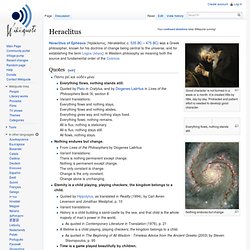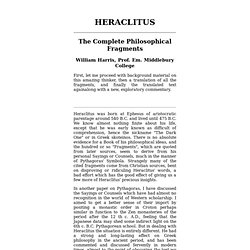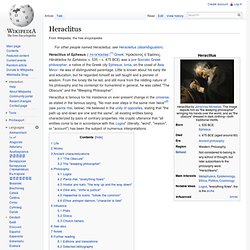

Heraclitus. Good character is not formed in a week or a month.

It is created little by little, day by day. Protracted and patient effort is needed to develop good character. Heraclitus of Ephesus (Ἡράκλειτος, Herakleitos; c. 535 BC – 475 BC) was a Greek philosopher, known for his doctrine of change being central to the universe, and for establishing the term Logos (λόγος) in Western philosophy as meaning both the source and fundamental order of the Cosmos. Quotes[edit] Everything flows, nothing stands still. Nothing endures but change. Πάντα ῥεῖ καὶ οὐδὲν μένει Everything flows, nothing stands still.Quoted by Plato in Cratylus, and by Diogenes Laërtius in Lives of the Philosophers Book IX, section 8Variant translations: Everything flows and nothing stays.
On the Universe[edit] Different sources sometimes number many of these fragments of the expressions of Heraclitus differently. You could not step twice into the same river; for other waters are ever flowing on to you. Opposition brings concord. Greek Philosophy and Heraclitus. The Complete Philosophical Fragments William Harris, Prof.

Em. Middlebury College First, let me proceed with background material on this amazing thinker, then a translation of all the fragments, and finally the translated text againalong with a new, exploratory commentary. Heraclitus was born at Ephesus of aristocratic parentage around 540 B.C. and lived until 475 B.C. In another paper on Pythagoras, I have discussed the Sayings or Counsels which have had almost no recognition in the world of Western scholarship.
Heraclitus has been studied intensively and in true academic fashion has been viewed in his historical position, as a building block in the development of ancient philosophy. My purpose here is to take Heraclitus at his word, when he says "Much learning does not teach understanding, otherwise it would have taught......... How can I compare Heraclitus with Einstein? 1. 1a.. 2. 3. 4. 5. 6. 7. 8.. 9. 10. 11.. Heraclitus - Fragments. Heraclitus. Heraclitus of Ephesus (/ˌhɛrəˈklaɪtəs/;[1] Greek: Ἡράκλειτος ὁ Ἐφέσιος, Hērákleitos ho Ephésios; c. 535 – c. 475 BCE) was a pre-Socratic Greek philosopher, a native of the Greek city Ephesus, Ionia, on the coast of Asia Minor.

He was of distinguished parentage. Little is known about his early life and education, but he regarded himself as self-taught and a pioneer of wisdom. From the lonely life he led, and still more from the riddling nature of his philosophy and his contempt for humankind in general, he was called "The Obscure" and the "Weeping Philosopher". Heraclitus is famous for his insistence on ever-present change in the universe, as stated in the famous saying, "No man ever steps in the same river twice"[2] (see panta rhei, below). He believed in the unity of opposites, stating that "the path up and down are one and the same", all existing entities being characterized by pairs of contrary properties. Life[edit] Ephesus on the coast of Asia Minor, birthplace of Heraclitus.